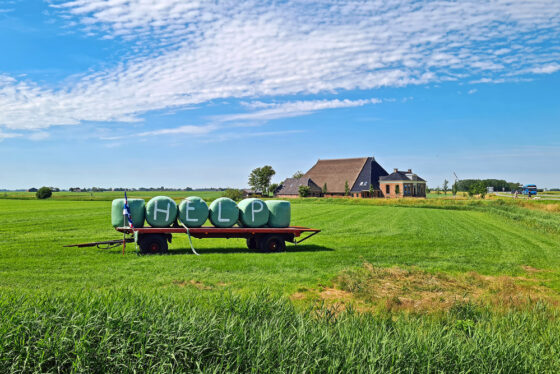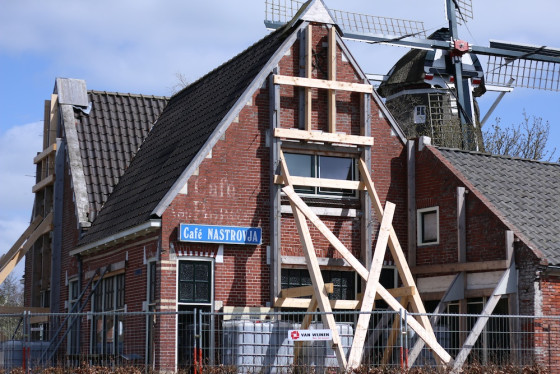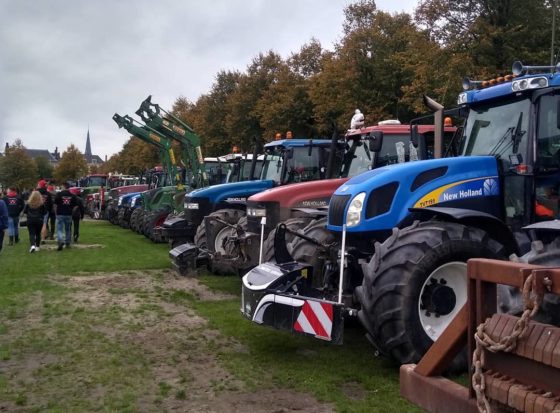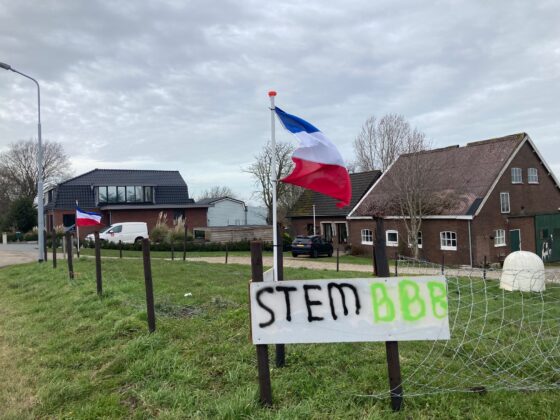Provincial elections reveal deep-lying distrust in Dutch politics


For the last six months the Silja Europa has been at the eye of a gathering political storm in the harbour village of Velsen-Noord.
In September, as the Dutch government frantically tried to fix the chronic overcrowding problem at the national refugee reception centre in Ter Apel, it came up with the idea of accommodating 1,000 people on a stripped-down cruise ship. The municipal council in Velsen, one of the few with the facilities to host a liner, stepped forward.
Aware of the sensitivities of mooring a floating asylum hotel next to a community of 5,000 people, councillors agreed a deal with conditions. Classrooms and medical facilities were provided on board to avoid overstraining local services. Electricity was supplied from the shore to keep the air conditioning running. And, crucially, it was a temporary measure. After six months the ship would sail away and the refugees would be rehoused.
‘The end date of March 1 was set in stone in the contract,’ says Joost Bleekman, leader of local party Velsen Lokaal. ‘March 1 is March 1, we wouldn’t budge or even ask the question.’
But as the months rolled by, it became clear the government was struggling to find a solution. Junior asylum minister Eric van der Burg had hoped to pass a law that would give him more powers to disperse refugees around the country, but his party colleagues in The Hague fought against it. And so in mid-January, six weeks before the contract expired, Van der Burg made a ‘moral appeal’ to Velsen to extend the deadline.
Realising that it would be political suicide to go back on an explicit promise, the council decided to hold a referendum, but it proved impossible to arrange before March 1. So the ship is still in the harbour and the debate in Velsen has turned sour. A black and white banner at the entrance to the village calls for mayor Frank Dales to step down. When the referendum eventually took place in early March, 59% of participants voted ‘no’.
The council says it will honour the result and ensure the ship leaves by April 16, though it is also looking at hiring a smaller vessel for 400 refugees who have formed ‘strong ties with Velsen’.
Polarising issues
Had the vote been held before March 1, Bleekman believes the situation could have been rescued. Despite initial fears, the presence of the ship caused little disruption in the community, children were integrated into local schools and local businesses took on asylum seekers as apprentices. But once the deadline passed without the ship moving it became an impossible struggle.

‘On a polarising issue like asylum it’s almost impossible to do the right thing by anyone,’ he says. ‘One person says you need to accommodate these people, otherwise you’ve got no heart; another person says we need to send them away and look after our own residents.
‘But there are also a lot of people who say to us: we had a deal. March 1 is March 1.
‘I think a small group of people will be left with a lingering distrust of politics because we broke our promise over March 1. And I understand why. It hurts. You don’t go into politics so you can go back on your agreements.’
The episode is typical of the climate of distrust pervading Dutch politics as voters prepare to choose members of the 12 provincial elections on March 15. Intractable differences on issues such as asylum and the need to reduce nitrogen pollution are straining the Netherlands’ ‘polder model’ of inclusive consensus building.
Public confidence has been shaken in the wake of public inquiries into gas drilling in Groningen and the tax office’s pursuit of families who were wrongly suspected of cheating the childcare support system. In both cases politicians in The Hague were found to have systematically neglected the people they were supposed to serve, with devastating consequences for their homes, their health and their families.
Distrust eclipses hope
A recent poll by voter research bureau Kieskompas found that half of people disagreed with the statement: ‘In general I feel my voice is heard’, while the majority believed they had no say in what the government did. The sentiment was strongest in the provinces furthest from The Hague: Groningen, Limburg and Zeeland.
When asked to choose a word from a list that best described their feelings about politics, the dominant sentiment was ‘distrust’, chosen by 51% of people in Zeeland and 45% of Limburgers. ‘Hope’ scored no higher than 12%, though that was in the north-eastern province of Groningen.
Sociologist Bram van Vulpen of Groningen University, who specialises in regional inequality, says the defining divide in the Netherlands is not between city and country, as is often assumed, but between the centre and the fringes. He points out that around 60% of MPs live in the ‘Randstad’ area – the region around the four cities Amsterdam, Rotterdam, The Hague and Utrecht – even though they only contain around 40% of the population.
‘There is an over-representation of what is already the largest group, and I think a lot of people notice that,’ says Van Vulpen. ‘But at the same time, if you look within the periphery you see that some regions do better than others and are well represented for their population size. Those are what we call vocal regions.’
Groningen earthquakes
Together with his colleague, Caspar van den Berg, Van Vulpen analysed questions asked by MPs over the last 27 years to compare how often different parts of the country were mentioned in parliament. Some of the results were surprising: north-east Groningen received more attention relative to its population size than any other part of the country, while the other two provinces where distrust reigns, Limburg and Zeeland, also did relatively well.
But the results give rise to another question: how often do debates in parliament make a real difference to the lives of people in the provinces? The questions about north-east Groningen were dominated by the impact of drilling for natural gas on the ground beneath people’s homes, yet the government continued to ramp up production levels until 2013, the year after an earthquake measuring 3.6 on the Richter scale shook the village of Huizinge.

Even after the cabinet and the oil companies exploiting the Groningen gas field, Shell and ExxonMobil, accepted that their activities had caused hundreds of earthquakes and damaged an estimated 85,000 buildings, the compensation process was a bureaucratic minefield. The parliamentary inquiry concluded that the interests of people in Groningen were ‘systematically neglected’ for decades because gas drilling was so lucrative for the finance ministry.
Peter Rebergen, a member of Groningen’s city council for the ChristenUnie party, says the conclusions came as no surprise to people who have been waiting for years to have their damaged homes repaired. ‘If you look back at the recent period, there’s been a lot of talk but very little has happened,’ he says. ‘People’s confidence in the government has gone in Groningen.’
Homeowners who tried to secure compensation were bogged down by drawn-out claims procedures and constantly changing rules. The NAM, the joint venture set up by Shell and ExxonMobil to exploit the gas field, put the burden of proof on owners to show that the cracks in their walls were caused by earthquakes, dragged its feet on inspections and tried to minimise its liability.
As recently as 2021 it was arguing that only 50 houses in the province needed to be strengthened against earthquake damage, because the risk was much lower now that the level of gas drilling had been reduced to a minimum.
‘Bureaucracy came first’
The government compounded its failures in Groningen by investing more in shoring up the bureaucratic process than damaged houses. A study by the Court of Audit found that 74 cents out of every euro put into the compensation fund was swallowed up in administrative costs.
‘Bureaucracy came first,’ says Rebergen. ‘The people of Groningen have had to contend with a jungle of organisations and agencies, rules and procedures.’
He argues that if the government wants to regain people’s trust, it has to start trusting them. ‘If a resident says their house has been damaged by gas drilling, they should take that as their starting point and work with citizens to find solutions. If you say you’ll do something you need to follow up on it. That way you might slowly be able to win back the confidence of local residents. But it will take years and years.’
Van Vulpen says it can take generations for politicians to win back lost trust. ‘I’ve spoken to people in north-east Friesland, where up until the 1950s workers in the peat colonies lived in rudimentary turf huts, and they say: my grandparents were systematically neglected while huge improvements were being made to housing in the rest of the Netherlands. It can last so long and be passed down from generation to generation, and that makes it difficult.’
Populist parties
The growth in the perceived gap between The Hague and the provinces has gone hand in hand with the rise of populist parties, especially on the right. It began in the cities with Pim Fortuyn’s Leefbaar Rotterdam party in the late 1990s, which portrayed migrants in inner cities as the biggest threat to the Dutch way of life. Four years ago Forum voor Democratie (FVD) eclipsed the mainstream parties in the provincial elections on a manifesto charged with anti-government sentiment on issues ranging from European Union membership to climate change.

In 2023 the grudge issue is the government’s plans to buy out farmers and cut the size of the livestock sector after the Council of State ruled that the Netherlands was exceeding its limits on nitrogen compound emissions. The BoerBurgerBeweging, or Farmer-Citizen Movement, a party founded less than three years ago by Caroline van der Plas, is projected to become the largest party in as many as five provinces and win around nine of the 75 Senate seats.
Just how deep-seated the nitrogen problem has become was underlined last week when Noord-Brabant province announced it was suspending all environmental permits for building projects that generate more nitrogen compound emissions because of the risk to protected habitats. Plans for hundreds of social housing units have been shelved, a move which puts a spanner in the works of the government’s plans to build 130,000 new houses in the province by 2030.
The BBB disputes the scientific basis of the court judgment and is calling for the law to be changed to raise the maximum ‘critical deposition value’ of nitrogen emissions in vulnerable areas. The party claims this would allow building projects to resume without harming nature, but other parties, such as the Christian Democrats (CDA), say the BBB is ‘explaining away’ the problem rather than tackling it.
Over-complicated
Ilona Lagas, who heads the BBB’s list of candidates for the Senate and is also standing in Overijssel province, says the government is too fixed on meeting green energy targets rather than listening to people in rural communities. ‘Polder politics is still there, but it needs to be better balanced so that everyone has an equal input,’ she says.
‘We want to work with all other parties, but one thing that is essential for us is that policies have to be feasible. So many decisions and proposals are over-complicated or can’t be explained that ordinary people end up losing all trust in politics.’
Populist parties have flourished in the last 25 years as loyalty to the volkspartijen – the CDA, VVD and Labour party (PvdA) – has declined. The rise of the BBB has come mainly at the expense of the CDA, whose share of the vote is projected to crumble to around 6%.
‘The BBB has seized on that feeling of “we’re being ignored by politicians in The Hague who only look after their own interests”,’ says Van Vulpen. ‘And at the same time established parties like the CDA and the VVD, who have always had a big support base in rural areas, have seen their popularity decline.’

Van Vulpen points out that not all disaffected voters drift to right-wing populist parties, but the relationship is clear. ‘When we talk about feelings of regional discontent, we can see that it reflects the axis of centrum and periphery. And you can see that in areas where average incomes are lower and the population is declining, the feeling that people aren’t being heard or there is underinvestment in their region is stronger.’
Fragmented politics
The decline in support for the established parties has also led to a fragmented landscape, as parties emerge with a narrower support bases, such as the BBB or Denk, whose vote comes from migrants in urban areas. The result is that more parties are needed to form coalitions and governments are less stable, particularly when the election result forces parties that distrust each other to work together.
The provincial coalition in Noord-Brabant has collapsed twice in the last four years: first at the end of 2019 when the CDA withdrew support for a plan to reduce nitrogen emissions, then again 18 months later when a new partnership between CDA, VVD and Forum voor Democratie fell apart after Forum, which lost five of its nine seats to internal party disputes, proved to be an unreliable partner.
Van Vulpen sees both positives and negatives in the growing number of political parties. ‘From a democratic perspective it’s a positive thing that we have a party representing the farmers in the discussion about city and country. But it creates so many challenges at the administrative level, both in national and local politics.
‘That increases the workload for politicians, because parties have fewer representatives for all their portfolios. So we need to think about better support for elected representatives – not the ministers and aldermen, but members of parliament, councillors and provincial assembly members.’
The fact that so many people are still willing to set up political parties and stand for election is a sign that trust in politics is not dead, Van Vulpen believes. ‘But you have to give people the feeling that they have a say on issues that are important to them, especially in their own area.’
And in that sense this year’s elections are significant, as the coalitions formed at provincial level will decide how policies such as the farming buyouts are implemented on the ground. ‘It’s a long time since the provinces have been so important on the political issues and social problems that people face,’ Van Vulpen says. ‘So voters really have a choice to make.’
Thank you for donating to DutchNews.nl.
We could not provide the Dutch News service, and keep it free of charge, without the generous support of our readers. Your donations allow us to report on issues you tell us matter, and provide you with a summary of the most important Dutch news each day.
Make a donation